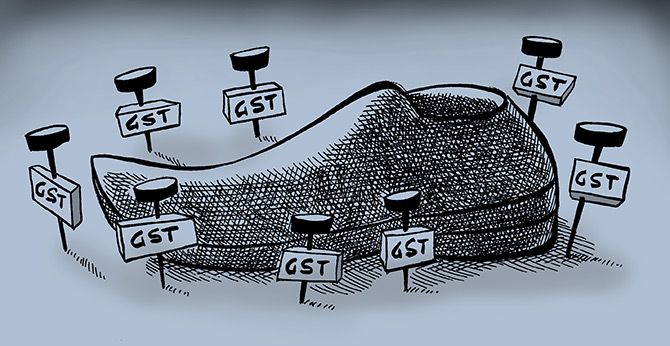The immediate concern for all companies is to prepare themselves - and their vendors and suppliers - for the new GST return filing mechanism, being test piloted from April 1.
Illustration: Uttam Ghosh/Rediff.com

From April 1 onwards - with the onset of the new financial year - India Inc’s compliance score will be under the scanner.
Be it getting ready for a new GST return filing mechanism, changes in composition of the board of directors, closer scrutiny over group operations, changes in the treatment of certain financial contracts or in reporting of financial numbers, businesses will have to get their act in place.
The immediate concern for all companies is to prepare themselves - and their vendors and suppliers - for the new GST return filing mechanism, being test piloted from April 1.
It is likely to be formally introduced in July.
In the new mechanism, the uploaded GST invoices will be visible on a real-time basis to the taxpayer and the recipient of goods or services.
Experts say all the buyers are expected to request their respective vendors to upload invoices immediately to enable them to check the same ‘online’.
This effectively means that all the GST registered buyers will be required to check whether their vendors are uploading the invoices and are paying taxes and filing returns, says Pritam Mahure, Pune-based GST expert.
“The process is sending shivers down the spine of large GST payers who have already experienced sleepless nights due to non-responsive GST network portal,” adds Mahure.
The adoption of new accounting standard (Ind-AS), especially those related to the treatment of leases, is likely to throw several challenges at companies.
Ind AS 116 (that pertains to leases) marks a shift in lease accounting by bringing off-balance sheet leases on the balance sheet.
“There is likely to be an increase in reported assets, liabilities and EBITDA of lessees,” says Karan Marwah, partner and head – capital markets, KPMG in India.
Once the new standard is notified by the Ministry of Corporate Affairs, experts say, this will impact a wide number of sectors, including airline, retail and infrastructure, and also on companies that seek large volume of equipment financing and those with large lease portfolios.
“The larger the lease portfolio, the greater the impact on key reporting metrics and financial ratios,” says Marwah.
As commercial banks move to Ind AS, by FY 2020, it will require early recognition and a significant increase in provisions for loans and off-balance sheet exposures based on an expected credit loss (ECL) model.
Experts point out that it will also require banking companies to assess their business model in order to classify and measure financial assets.
“The new impairment provision would require both financial services entities and the regulator to take a closer look at the impact on capital planning, pricing and alignment to risk management,” says Marwah.
Some of the key recommendations of the Kotak committee and amendments to the Sebi (LODR) Regulations - that will come into effect from April 1 - include changes in the composition and the role of the board of directors.
The top 1,000 listed entities will now need to have a minimum of six directors on their board, with the first 500 ensuring at least one independent director on the board.
The regulations envisage an enhanced role for board committees, along with closer monitoring of group entities and related parties.
Experts point out that mandatory disclosure of consolidated financial results on a quarterly basis and of cash flow statement on a half-yearly basis will improve transparency in financial statements.
According to Sandip Khetan, partner and national leader, financial accounting advisory services, EY India, “Companies will need to update their related party list to include promoter group entities holding 10 per cent or more in a listed entity to be able to gather information on transactions.”
Additionally, lot of new information now need to be provided to the board of holding companies for all material transactions recorded in the books of the subsidiary companies, say experts.
“To embrace the changes, the board will have to revisit the composition and role of committees, the independence criteria and the evaluation process of independent directors,” says Manpreet Singh Ahuja, partner & leader-risk assurance services, PwC India.












 © 2025
© 2025